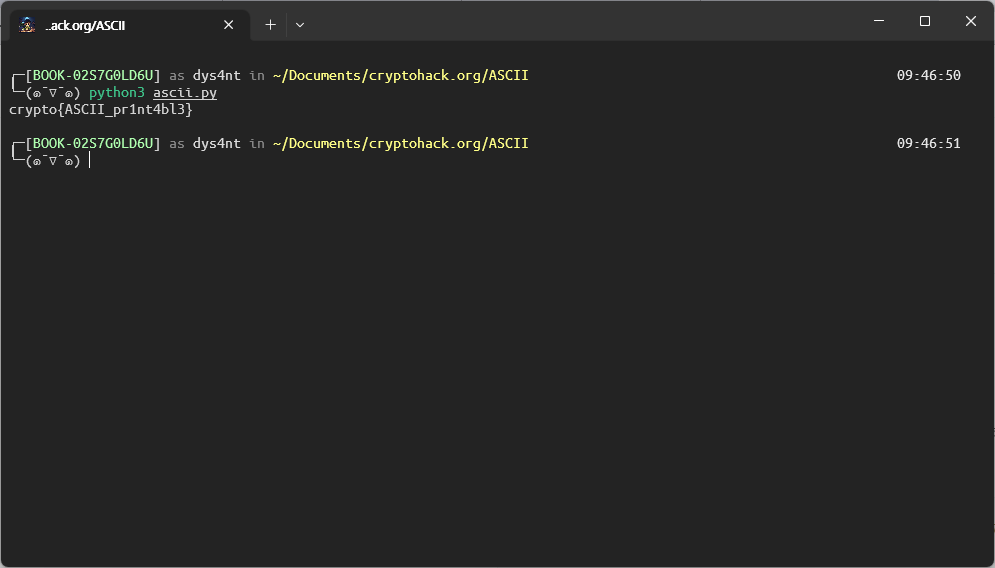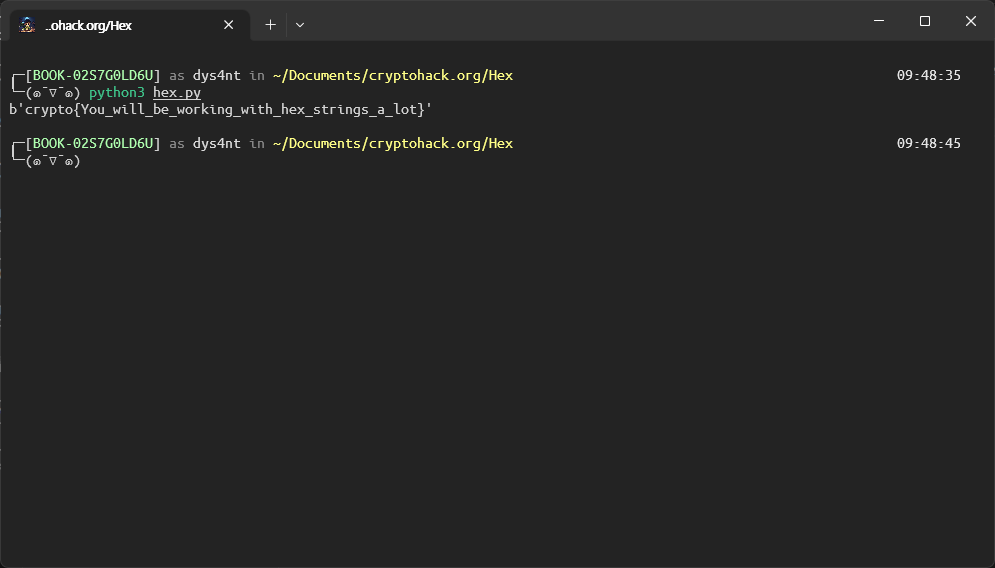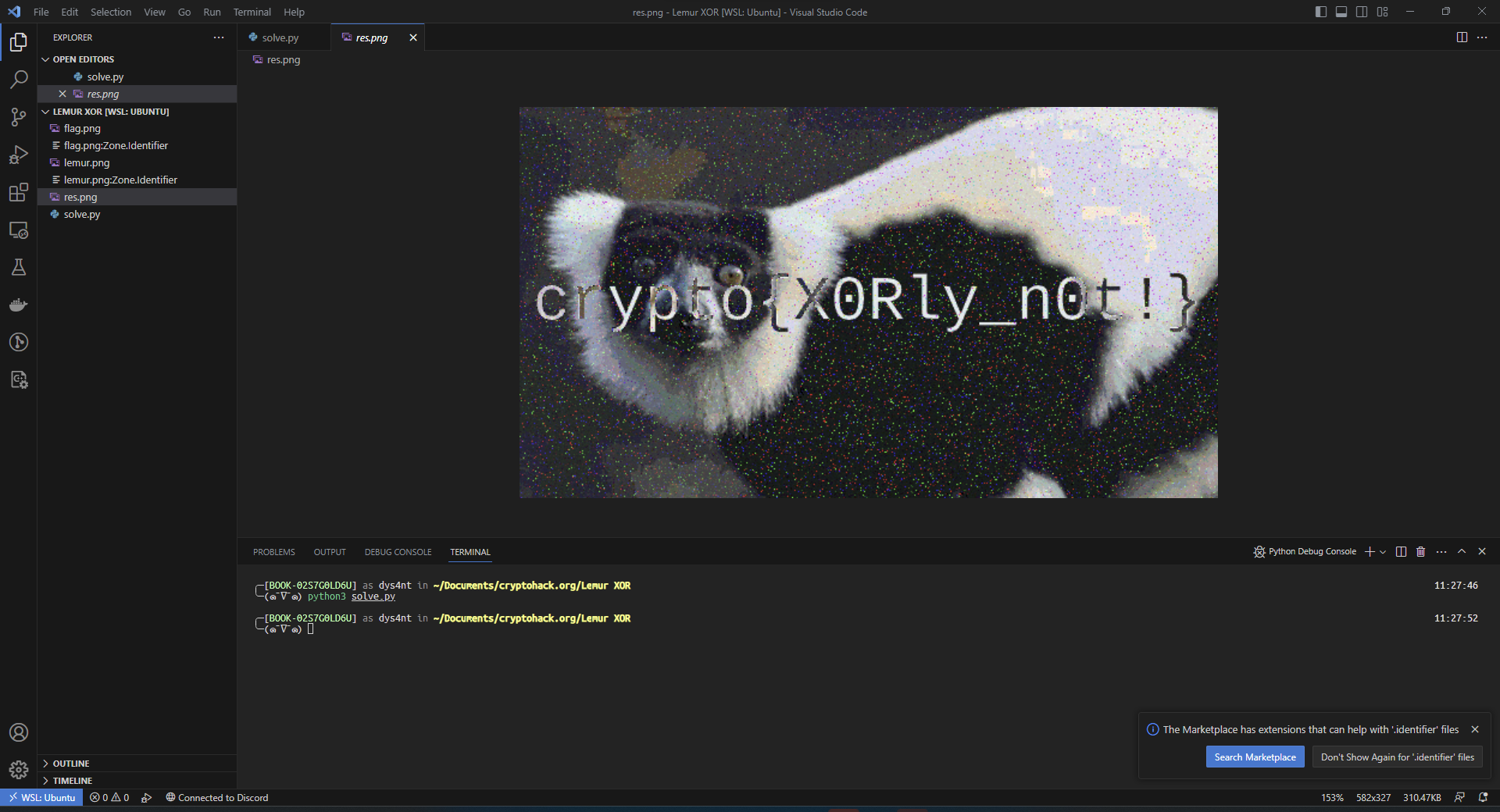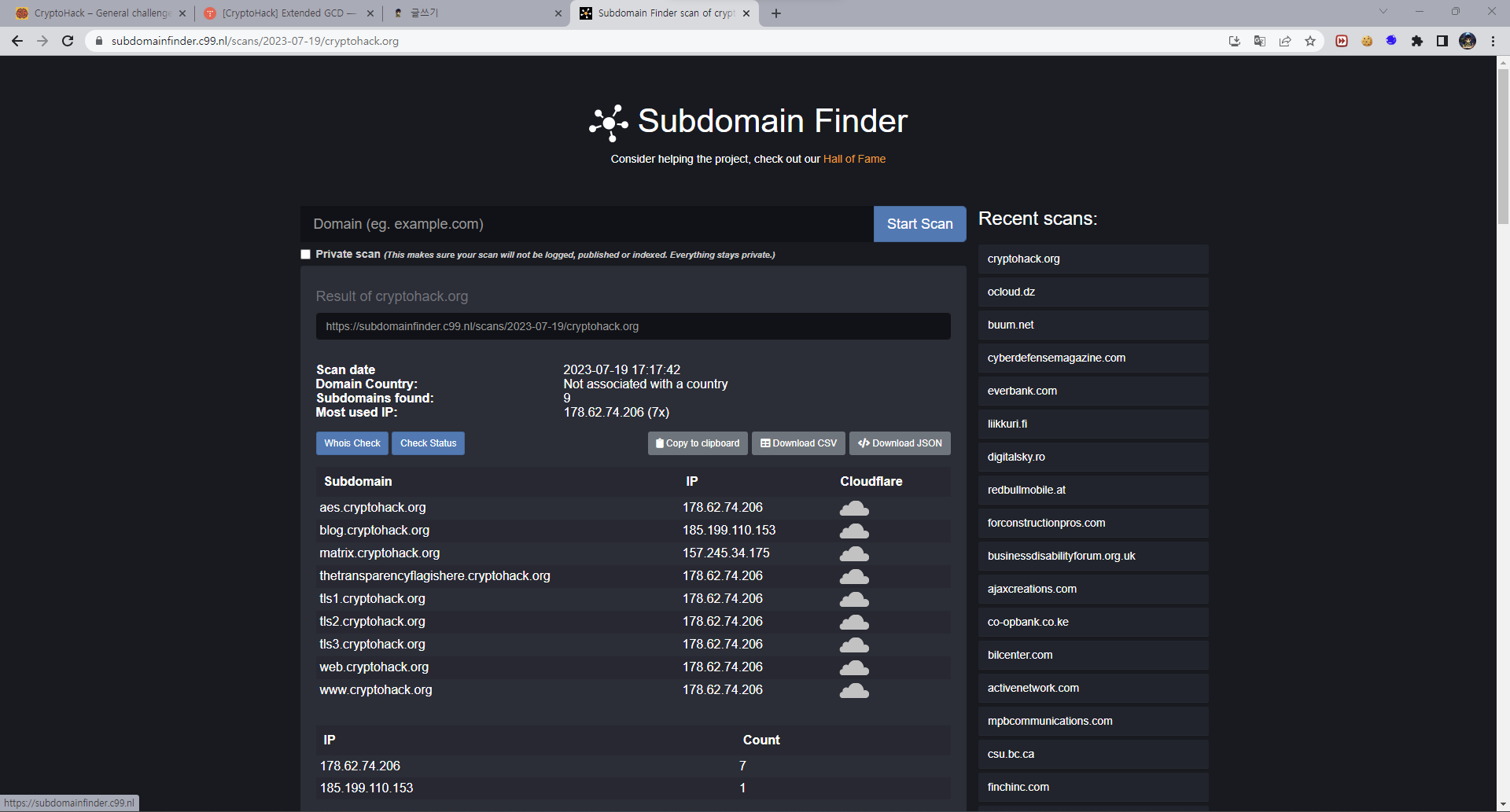| 일 | 월 | 화 | 수 | 목 | 금 | 토 |
|---|---|---|---|---|---|---|
| 1 | 2 | 3 | 4 | 5 | 6 | 7 |
| 8 | 9 | 10 | 11 | 12 | 13 | 14 |
| 15 | 16 | 17 | 18 | 19 | 20 | 21 |
| 22 | 23 | 24 | 25 | 26 | 27 | 28 |
- cce2023
- SECGAME
- cookie
- webhacking.kr
- cryptohack.org
- PS
- pwn.college
- 예전글
- 예전글 #PS
- blind-sqli
- regex
- pwn
- XSS
- 예전글 #CNN
- Crypto
- JS
- blind_sqli
- Bob
- Pwnable.kr
- pwnable
- 백준
- web
- SQLi
- HTB
- Today
- Total
아모에요
[cryptohack.org] General 본문
Encoding
ASCII
주어진 리스트를 복붙한 다음 chr를 이용해서 파이썬 스크립트를 구현하면
li = [99, 114, 121, 112, 116, 111, 123, 65, 83, 67, 73, 73, 95, 112, 114, 49, 110, 116, 52, 98, 108, 51, 125]
res = ""
for n in li:
res += chr(n)
print(res)
crypto{ASCII_pr1nt4bl3}
Hex
마찬가지로 hex로 인코딩된 문자열이 주어진다. 이를 bytes.fromhex() 함수를 이용해서 bytes로 치환하자.
s = "63727970746f7b596f755f77696c6c5f62655f776f726b696e675f776974685f6865785f737472696e67735f615f6c6f747d"
b = bytes.fromhex(s)
print(b)
crypto{You_will_be_working_with_hex_strings_a_lot}
Base64
hex string이 주어지고 이를 byte array로 바꾼 다음 bae64.b64encode() 함수로 b64 encode하자.
import base64
s = "72bca9b68fc16ac7beeb8f849dca1d8a783e8acf9679bf9269f7bf"
b = bytes.fromhex(s)
print(base64.b64encode(b))
crypto/Base+64+Encoding+is+Web+Safe/
Bytes and Big Integers
long 숫자가 주어지고 이를 pycryptodome 패키지의 long_to_bytes 함수를 이용해서 bytes로 바꾼 다음 출력하면 된다.
from Crypto.Util.number import *
num = 11515195063862318899931685488813747395775516287289682636499965282714637259206269
b = long_to_bytes(num)
print(b)
crypto{3nc0d1n6_4ll_7h3_w4y_d0wn}
Encoding Challenge
#!/usr/bin/env python3
from Crypto.Util.number import bytes_to_long, long_to_bytes
from utils import listener # this is cryptohack's server-side module and not part of python
import base64
import codecs
import random
FLAG = "crypto{????????????????????}"
ENCODINGS = [
"base64",
"hex",
"rot13",
"bigint",
"utf-8",
]
with open('/usr/share/dict/words') as f:
WORDS = [line.strip().replace("'", "") for line in f.readlines()]
class Challenge():
def __init__(self):
self.challenge_words = ""
self.stage = 0
def create_level(self):
self.stage += 1
self.challenge_words = "_".join(random.choices(WORDS, k=3))
encoding = random.choice(ENCODINGS)
if encoding == "base64":
encoded = base64.b64encode(self.challenge_words.encode()).decode() # wow so encode
elif encoding == "hex":
encoded = self.challenge_words.encode().hex()
elif encoding == "rot13":
encoded = codecs.encode(self.challenge_words, 'rot_13')
elif encoding == "bigint":
encoded = hex(bytes_to_long(self.challenge_words.encode()))
elif encoding == "utf-8":
encoded = [ord(b) for b in self.challenge_words]
return {"type": encoding, "encoded": encoded}
#
# This challenge function is called on your input, which must be JSON
# encoded
#
def challenge(self, your_input):
if self.stage == 0:
return self.create_level()
elif self.stage == 100:
self.exit = True
return {"flag": FLAG}
if self.challenge_words == your_input["decoded"]:
return self.create_level()
return {"error": "Decoding fail"}
listener.start_server(port=13377)13377.py 파일을 보면 {"type": encoding, "encoded": encoded}로 JSON 형태의 데이터를 리턴하는 것을 확인할 수 있다.
pwntools을 이용해서 자동으로 이를 입력받은 다음 디코딩 과정을 거쳐서 디코딩된 데이터를 {"decoded" : dec } 형태로 보내는 코드를 짜면 된다.
from pwn import *
from Crypto.Util.number import *
import json
import codecs
r = remote("socket.cryptohack.org",13377)
# context.log_level = "debug"
def send_json(s):
obj = {}
obj['decoded'] = s
s = json.dumps(obj)
r.sendline(s)
for i in range(100):
li = r.recvline().split(b":")
method = li[1].split(b",")[0][2:-1]
enc = li[2][2:-3]
# print(method)
# print(enc)
if method == b'base64':
decoded = base64.b64decode(enc).decode()
send_json(decoded)
elif method == b'hex':
decoded = bytes.fromhex(enc.decode()).decode()
send_json(decoded)
elif method == b'rot13':
decoded = codecs.decode(enc.decode(),'rot13')
send_json(decoded)
elif method == b'bigint':
num = int(enc.decode(),16)
decoded = long_to_bytes(num).decode()
send_json(decoded)
else:
li = enc.decode().split(", ")
decoded = ""
for i in li:
decoded += chr(int(i))
send_json(decoded)
print(r.recvline())
crypto{3nc0d3_d3c0d3_3nc0d3}
XOR
XOR Starter
문자열 label의 각 문자에 대해서 13과 XOR한 다음 결과를 출력하는 코드를 작성하면
s = b'label'
for i in range(5):
print(chr(s[i] ^ 13))aloha가 나온다.
crypto{aloha}
XOR Properties
k1, k2^k1, k2^k3, flag^k1^k3^k2가 주어진다.
flag = flag^k1^k3^k2^k2^k3^k1이므로
이를 계산하는 코드를 구현하면
from pwn import *
k1 = bytes.fromhex("a6c8b6733c9b22de7bc0253266a3867df55acde8635e19c73313")
k2k1 = bytes.fromhex("37dcb292030faa90d07eec17e3b1c6d8daf94c35d4c9191a5e1e")
k2k3 = bytes.fromhex("c1545756687e7573db23aa1c3452a098b71a7fbf0fddddde5fc1")
fk1k3k2 = bytes.fromhex("04ee9855208a2cd59091d04767ae47963170d1660df7f56f5faf")
flag = xor(xor(fk1k3k2,k2k3),k1)
print(flag)crypto{x0r_i5_ass0c1at1v3}
Favorite byte
브포로 모든 1바이트에 대해서 xor하는 코드를 구현하자.
from pwn import *
b = bytes.fromhex("73626960647f6b206821204f21254f7d694f7624662065622127234f726927756d")
for i in range(256):
print(xor(b,i))crypto{0x10_15_my_f4v0ur173_by7e}
You either know, XOR you don't
hex 스트링과 플래그 포맷 crypto{}를 XOR하여서 key를 추출하려 시도하였는데, crypto{에 대해서 myXORke까지 출력되었다. 키를 myXORkey라 가정하고 이 키를 이용해서 주어진 스트링과 XOR하면 플래그가 나온다.
from pwn import *
b = bytes.fromhex("0e0b213f26041e480b26217f27342e175d0e070a3c5b103e2526217f27342e175d0e077e263451150104")
f = b"myXORkey"
print(xor(b,f))crypto{1f_y0u_Kn0w_En0uGH_y0u_Kn0w_1t_4ll}
Lemur XOR
두 이미지 파일이 주어진다. 이 이미지 파일들을 XOR하면 플래그가 나올 것 같다.
import numpy as np
from PIL import Image
img1 = Image.open("lemur.png")
img2 = Image.open("flag.png")
n1 = np.array(img1)*255
n2 = np.array(img2)*255
res_img = np.bitwise_xor(n1,n2).astype(np.uint8)
Image.fromarray(n_img).save('res.png')
crypto{X0Rly_n0t!}
Mathematics
Greatest Common Divisor
gcd(66528,52920)을 계산하면 된다.
import sympy as sp
print(sp.gcd(66528,52920))1512
Extended GCD
확장된 유클리드 알고리즘을 이용해서 합동식을 계산하면 된다.
def EEA(a,b):
r1,r2 = a,b
p1,p2 = 1,0
q1,q2 = 0,1
while r2>0:
n = r1 // r2
r1,r2 = r2,r1%r2
p1,p2 = p2,p1-n*p2
q1,q2 = q2,q1-n*q2
print("{} = {} * ({}) + {} * ({})".format(r1,a,p1,b,q1))
EEA(26513, 32321)
-8404
Modular Arithmetic 1

두 수중 작은 값이므로 4
Modular Arithmetic 2
a^(p-1) mod p를 계산하고 a와 p는 서로소이므로 정답은 1이다.
Modular Inverting
3의 mod 13에 대한 잉여역수를 계산하라고 한다. 3의 11승을 계산하면 된다. => 9

Data Formats
Privacy-Enhanced Mail?
from Crypto.PublicKey import RSA
s = open("privacy_enhanced_mail.pem",'r').read()
k = RSA.import_key(s)
print(k.d)
CERTainly not
import ssl
from Crypto.PublicKey import RSA
db = open("2048b-rsa-example-cert.der",'rb').read()
pem = ssl.DER_cert_to_PEM_cert(db)
k = RSA.import_key(pem)
print(k.n)
SSH Keys
from Crypto.PublicKey import RSA
t = open("bruce_rsa.pub",'r').read()
k = RSA.import_key(t)
print(k.n)
Transparency

https://thetransparencyflagishere.cryptohack.org/
에 접속하면 플래그가 나온다.
crypto{thx_redpwn_for_inspiration}
'Study > Hacking' 카테고리의 다른 글
| [dreamhack.io] Textbook-CBC (0) | 2023.07.14 |
|---|---|
| [dreamhack.io] phpythonode (0) | 2023.07.13 |
| [dreamhack.io] node_api (0) | 2023.07.13 |
| [HackTheBox] Templated (0) | 2023.07.13 |
| [pwn.college] Talking Web - level1 (0) | 2023.07.13 |

